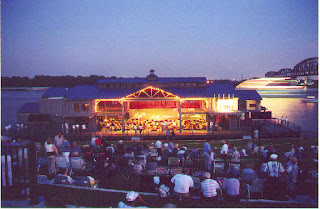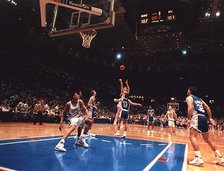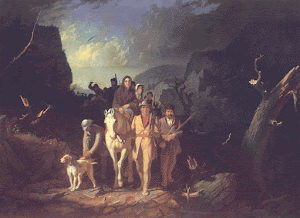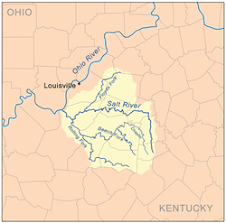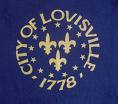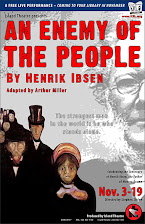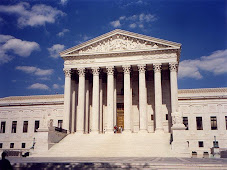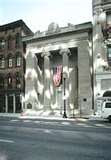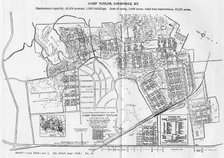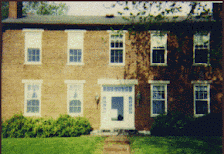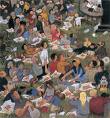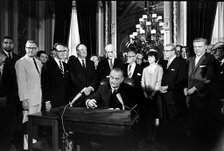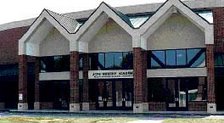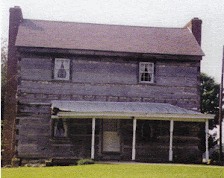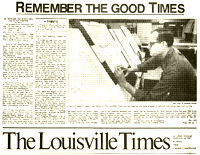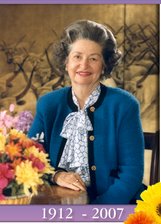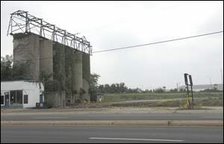There is a lot of hullaballoo going on here and there over comments made by His Honor the Mayor of Louisville-Jefferson County Metro, calling the former City of Louisville, which I sorely miss and of which I often write, "poorer, blacker, and older" in the days leading up to the Merger vote. I've heard the mayor use the phrase a number of times, including almost a decade ago as he, Jefferson County Judge/Executive Judge Rebecca Jackson, the C-J, Senator Mitch McConnell, and others hoodwinked the voters into voting for merger with promises of smoother, cheaper, and more effecient government, none of which has yet happened.
When the mayor has used the phrase it has never upset me in the way that it seems to have presently upset any number of people on various sides of different demographic and political aisles. In defense of the mayor (words you rarely have ever seen me write), he very simply and succinctly told the truth as it existed in 1999 and 2000, leading up to that fateful day in November of the latter when Jefferson County's voters by a majority vote ended what was, at least for residents and taxpayers of the old City, now called the Urban Services District, a pretty-good gig.
 The days of a friendly Democratically-controlled Board of Aldermen for the 230,000 or so residents of the former City, the only government entity which "went away" by the merger vote, came to an abrupt end on January 3, 2003, with the election and swearing-in of a twenty-six member Metro County Council, eleven of which were Republican. [As a note, I went to work for one member of the Council, the first new Democrat elected (meaning there is now one less Republican) since the commencement of the new government, on January 2nd of the this year].
The days of a friendly Democratically-controlled Board of Aldermen for the 230,000 or so residents of the former City, the only government entity which "went away" by the merger vote, came to an abrupt end on January 3, 2003, with the election and swearing-in of a twenty-six member Metro County Council, eleven of which were Republican. [As a note, I went to work for one member of the Council, the first new Democrat elected (meaning there is now one less Republican) since the commencement of the new government, on January 2nd of the this year].
What I see no one writing about in this debate are two things. First, acknowedgment that the days of white-flight, exascerbated as one writer indicated on another blog by the Federal Judge James F. Gordon's 1975 ruling desegregating the recently merged Louisville Independent Schools and Jefferson County Public Schools, are basically over at least in downtown Louisville. I am sure when the 2010 census data are released, there will be a larger number of whites in the 4th Council district, which is centered on downtown. Not only will that district be whiter, it will also be much younger, and considerably less poor, all contrasts to the district (and the old City) as it existed a decade ago. That will make drawing a majority-voting African-American 4th council district rather difficult.
 But, back to the bussing discussion. For those of you who weren't around, it was a very turbulent time in our community. I was starting 10th grade that September, and was bussed from my home school (Southern, which had bussing) to my AP school (Durrett, which was exempt excepting the AP students) and then to my deseg school (Manual, which was also exempt excepting AP students) every morning with the order reversed every afternoon. It was a ridiculous arrangement which came to an end later in October, when the school system moved me (and a few other AP students) back to Durrett, which was exempt because its attendance boundary was gerrymandered to take in a great deal of the African-American community of Newburg, including students who lived on Ilex Avenue, whose backyards abutted the property of Thomas Jefferson High School, now one district over. Durrett and Thomas Jefferson have since closed; Durrett now houses Louisville Male High School, which has a county-wide attendance district, and Thomas Jefferson now houses a middle school, shown at left and also called Thomas Jefferson. Directly behind this school's back fence were students who lived in Durrett's district.
But, back to the bussing discussion. For those of you who weren't around, it was a very turbulent time in our community. I was starting 10th grade that September, and was bussed from my home school (Southern, which had bussing) to my AP school (Durrett, which was exempt excepting the AP students) and then to my deseg school (Manual, which was also exempt excepting AP students) every morning with the order reversed every afternoon. It was a ridiculous arrangement which came to an end later in October, when the school system moved me (and a few other AP students) back to Durrett, which was exempt because its attendance boundary was gerrymandered to take in a great deal of the African-American community of Newburg, including students who lived on Ilex Avenue, whose backyards abutted the property of Thomas Jefferson High School, now one district over. Durrett and Thomas Jefferson have since closed; Durrett now houses Louisville Male High School, which has a county-wide attendance district, and Thomas Jefferson now houses a middle school, shown at left and also called Thomas Jefferson. Directly behind this school's back fence were students who lived in Durrett's district.
Here is the history of the times:
On February 28, 1975, the Kentucky Board of Education ordered the merger of the Louisville and Jefferson County school systems effective April 1, 1975. On April 21, 1975, the United States Supreme Court denied appeals to reverse a Sixth Circuit Court order, and on July 17, 1975, a final order to U.S. District Judge James F. Gordon stipulated that a desegregation plan would be implemented at the beginning of the 1975–76 school year, which began on September 4, 1975. Ernest C. Grayson, former Jefferson County public school district deputy superintendent, became the first superintendent of the merged districts.
In 1978 Judge Gordon ended the court's active supervision of the desegregation plan. However, the order was never fully lifted. The Jefferson County public school district continued mandatory busing but changed its racial guidelines. In 1984 the desegregation plan for middle and high schools was changed to a system of zones and satellite areas. Mandatory busing was replaced in 1992 by a program designed to integrate elementary schools by giving parents a choice of schools. Racial guidelines were altered with each of the above plans. In 1996 the district approved a new integration plan requiring that all schools maintain racial guidelines of between 15 and 50 percent African American. Six black parents sued in 1998 to eliminate the student assignment plan based on race that limits the number of African Americans who can enroll in Central High School to a maximum of 50 percent.
All of that italicised language above is lifted from the Jefferson County Public Schools archives. But the truth is that white-flight took off in the County outside the old City in a big way the summer of 1975 and continued well into the 1980s and 1990s, at which point it subsided. However, it had already begun in the old City long before that. People a generation older than me speak of a day when the West End, specifically the area just east of Shawnee Park, was all white west of the 31st Street railroad. Indeed, as a sign to indicate they lived on different streets than those east of 31st, all the street-names changed when crossing under the K&IT (now Norfolk Southern) Railroad bridge.
Cedar became
Herman,
Walnut (which is now called Muhammad Ali) became
Michigan (which is also now called Muhammad Ali),
Madison became
Vermont,
Chestnut became
River Park, and
Magazine became
Del Park. Main, Market, Jefferson, and Broadway did not change names. So it is correct to say that white-flight began in the old City in the 1960s or even earlier, and that it continued into later decades. It is also correct to say bussing generated even more white-flight from the County outside the old City beginning in 1975. That flight became evident in the censusses [censae?] of 1980, 1990, and 2000, in
Bullitt, then
Oldham, and more recently
Spencer counties. Spencer's number lagged the others as there were no good roads from Jefferson into this neighboring county, and to this day, there is only one, KY155. But even it is dangerous, and still a narrow two-lane passageway, in most of Jefferson County. It opens up to a wide roadway with emergency lanes and broad shoulders south of
Fisherville in Jefferson County, and remains so all the way to the Spencer County seat,
Taylorsville.
The second thing I see no one discussing in the ongoing debate is the disparate taxing authorities which remain after merger, where we went from having one County government, about a dozen fire protection districts, and ninety-
five municipal corporations (
all with locally elected representation); to having one County government, about a dozen fire protection districts, and ninety-
four municipal corporations (
all with locally elected representation). The only local government that "went out of business" with merger, and along with it the
locally elected representation of the Board of Aldermen), was the old
City of Louisville. The one thing that didn't end was the old City's taxing district. Voters and property taxpayers in the old City today (and since merger)
have no locally elected representation, unlike all the other municipal corporations in the County (which have city mayors, and commissions or councils), as well as the County itself (which has a mayor and Metro Council). As you will read on the license plates in our nation's capital, that is called
Taxation without Representation, something we thought came to an end back in the 1780s after a war with England.
Not so. Such a system remains for those living in the old City of Louisville. That should be a point of discussion, notwithstanding that a number of those people, though not as many today as in 2000, are
poorer, blacker, and older, than their well-represented counterparts who reside outside the Urban Services District.
When will these disparate tax systems be merged?







